exam questions with answer ,class notes
EXCELLENT HOMEWORK HELP AND TUTORING ,ALL KIND OF QUIZ AND EXAMS WITH GUARANTEE OF A
Am an expert on major courses especially; psychology,Nursing, Human resource Management and Mathemtics Assisting students with quality work is my first priority. I ensure scholarly standards in my documents and that's why i'm one of the BEST GOLD RATED TUTORS in STUVIA. I assure a GOOD GRADE if you will use my work.
- 203
- 0
- 1
Community
- Followers
- Following
201 items
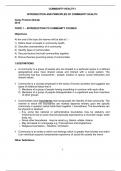
COMMUNITY HEALTH I
COMMUNITY HEALTH I INTRODUCTION AND PRINCIPLES OF COMMUNITY HEALTH 2015 TOPIC 1 – INTRODUCTION TO COMMUNITY STUDIES Objectives At the end of the topic the learner will be able to”: - 1) Define basic concepts in community health 2) Describe characteristics of a community 3) Identify types of communities 4) Discuss factors that hold communities together 5) Discus theories governing study of communities 1.0 DEFINITIONS A community is a group of people who...
- Class notes
- • 80 pages •
COMMUNITY HEALTH I INTRODUCTION AND PRINCIPLES OF COMMUNITY HEALTH 2015 TOPIC 1 – INTRODUCTION TO COMMUNITY STUDIES Objectives At the end of the topic the learner will be able to”: - 1) Define basic concepts in community health 2) Describe characteristics of a community 3) Identify types of communities 4) Discuss factors that hold communities together 5) Discus theories governing study of communities 1.0 DEFINITIONS A community is a group of people who...

PUERPERIUM
PUERPERIUM • Period from the end of the 3rd stage of labour up to 6 weeks postpartum/ refers to the time after delivery when maternal physiologic changes related to pregnancy return to the nonpregnant state • until most of the patient’s organs have returned to the non-pregnant state • Also called the postpartum or postnatal period PUERPERIUM The woman recovers from the stresses of pregnancy & delivery, Occurrence of physiological adaptations facilitating the restora...
- Class notes
- • 35 pages •
PUERPERIUM • Period from the end of the 3rd stage of labour up to 6 weeks postpartum/ refers to the time after delivery when maternal physiologic changes related to pregnancy return to the nonpregnant state • until most of the patient’s organs have returned to the non-pregnant state • Also called the postpartum or postnatal period PUERPERIUM The woman recovers from the stresses of pregnancy & delivery, Occurrence of physiological adaptations facilitating the restora...
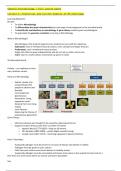
General Microbiology
General Microbiology – Full course notes Lecture 1: Historical and Current Aspects of Microbiology Learning Objectives Be able: • To define Microbiology • To differentiate the major characteristics for each type of microorganism in the microbial world • To identify the contributions to microbiology & germ theory made by past microbiologists • To appreciate the genomic revolution occurring in Microbiology What is Microbiology? - - - - - Microbiology is the study of or...
- Exam (elaborations)
- • 7 pages •
General Microbiology – Full course notes Lecture 1: Historical and Current Aspects of Microbiology Learning Objectives Be able: • To define Microbiology • To differentiate the major characteristics for each type of microorganism in the microbial world • To identify the contributions to microbiology & germ theory made by past microbiologists • To appreciate the genomic revolution occurring in Microbiology What is Microbiology? - - - - - Microbiology is the study of or...

The mental status examination( MSE)
The mental status examination( MSE) MSE is a cross-sectional, systemic documentation of the quality of mental functioning at the time of interview. It serves as a baseline for future comparison and to follow the progress of the patient. Outlines of MSE Appearance , Behaviour & Attitude (Cooperativeness) Speech Mood & Affect Thoughts Perceptions Cognitive functions Consciousness level orientation(time, place, person) atten...
- Class notes
- • 21 pages •
The mental status examination( MSE) MSE is a cross-sectional, systemic documentation of the quality of mental functioning at the time of interview. It serves as a baseline for future comparison and to follow the progress of the patient. Outlines of MSE Appearance , Behaviour & Attitude (Cooperativeness) Speech Mood & Affect Thoughts Perceptions Cognitive functions Consciousness level orientation(time, place, person) atten...
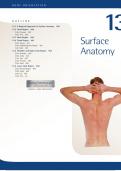
Surface Anatomy
Surface Anatomy 13 398 Chapter Thirteen Surface Anatomy I magine this scenario: An unconscious patient has been brought to the emergency room. Although the patient cannot tell the ER physician what is wrong or “where it hurts,” the doctor can assess some of the injuries by observing surface anatomy, including: ■ Locating pulse points to determine the patient’s heart rate and pulse strength ■ Palpating the bones under the skin to determine if a fracture has occurr...
- Class notes
- • 18 pages •
Surface Anatomy 13 398 Chapter Thirteen Surface Anatomy I magine this scenario: An unconscious patient has been brought to the emergency room. Although the patient cannot tell the ER physician what is wrong or “where it hurts,” the doctor can assess some of the injuries by observing surface anatomy, including: ■ Locating pulse points to determine the patient’s heart rate and pulse strength ■ Palpating the bones under the skin to determine if a fracture has occurr...
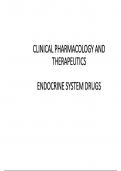
CLINICAL PHARMACOLOGY AND THERAPEUTICS ENDOCRINE SYSTEM DRUGS
CLINICAL PHARMACOLOGY AND THERAPEUTICS ENDOCRINE SYSTEM DRUGS Drugs and the endocrine system The endocrine system consists of glands, which are specialized cell clusters, and hormones, the chemical transmitters secreted by the glands in response to stimulation. A delicate balance Together with the central nervous system, the endocrine system regulates and integrates the body’s metabolic activities and maintains homeostasis (the body’s internal equilibrium). The drug typ...
- Exam (elaborations)
- • 36 pages •
CLINICAL PHARMACOLOGY AND THERAPEUTICS ENDOCRINE SYSTEM DRUGS Drugs and the endocrine system The endocrine system consists of glands, which are specialized cell clusters, and hormones, the chemical transmitters secreted by the glands in response to stimulation. A delicate balance Together with the central nervous system, the endocrine system regulates and integrates the body’s metabolic activities and maintains homeostasis (the body’s internal equilibrium). The drug typ...

)What is Normal Flora ?
)What is Normal Flora ? These are mixture of microorganisms regularly found at any anatomical site on /within the body of a healthy person. Some of these microorganisms are found in association with humans / animals only. Others are found in the environment as well. Normal flora types Resident vs. Transient Resident populations (normal flora, microbiota, indigenous microbial population, microflora, microbial flora) Vast majority of normal flora are bacteria. I...
- Class notes
- • 50 pages •
)What is Normal Flora ? These are mixture of microorganisms regularly found at any anatomical site on /within the body of a healthy person. Some of these microorganisms are found in association with humans / animals only. Others are found in the environment as well. Normal flora types Resident vs. Transient Resident populations (normal flora, microbiota, indigenous microbial population, microflora, microbial flora) Vast majority of normal flora are bacteria. I...
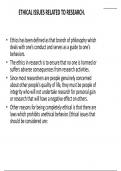
ETHICAL ISSUES RELATED TO RESEARCH
ETHICAL ISSUES RELATED TO RESEARCH. • Ethics has been defined as that branch of philosophy which deals with one’s conduct and serves as a guide to one’s behaviors. • The ethics in research is to ensure that no one is harmed or suffers adverse consequences from research activities. • Since most researchers are people genuinely concerned about other people’s quality of life, they must be people of integrity who will not undertake research for personal gain or research...
- Class notes
- • 5 pages •
ETHICAL ISSUES RELATED TO RESEARCH. • Ethics has been defined as that branch of philosophy which deals with one’s conduct and serves as a guide to one’s behaviors. • The ethics in research is to ensure that no one is harmed or suffers adverse consequences from research activities. • Since most researchers are people genuinely concerned about other people’s quality of life, they must be people of integrity who will not undertake research for personal gain or research...
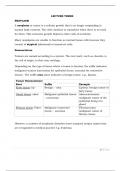
NEOPLASM
NEOPLASM A neoplasm or tumor is a cellular growth that is no longer responding to normal body controls. The cells continue to reproduce when there is no need for them. This excessive growth deprives other cells of nutrients. Many neoplasms are unable to function as normal tissue cells because they consist of atypical (abnormal) or immature cells. Nomenclature Tumors are named according to a system. The root word, such as chondro, is the cell of origin, in this case cartilage. D...
- Class notes
- • 8 pages •
NEOPLASM A neoplasm or tumor is a cellular growth that is no longer responding to normal body controls. The cells continue to reproduce when there is no need for them. This excessive growth deprives other cells of nutrients. Many neoplasms are unable to function as normal tissue cells because they consist of atypical (abnormal) or immature cells. Nomenclature Tumors are named according to a system. The root word, such as chondro, is the cell of origin, in this case cartilage. D...
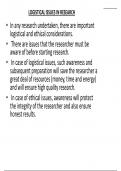
LOGISTICAL ISSUES IN RESEARCH
LOGISTICAL ISSUES IN RESEARCH • In any research undertaken, there are important logistical and ethical considerations. • There are issues that the researcher must be aware of before starting research. • In case of logistical issues, such awareness and subsequent preparation will save the researcher a great deal of resources (money, time and energy) and will ensure high quality research. • In case of ethical issues, awareness will protect the integrity of the researche...
- Exam (elaborations)
- • 9 pages •
LOGISTICAL ISSUES IN RESEARCH • In any research undertaken, there are important logistical and ethical considerations. • There are issues that the researcher must be aware of before starting research. • In case of logistical issues, such awareness and subsequent preparation will save the researcher a great deal of resources (money, time and energy) and will ensure high quality research. • In case of ethical issues, awareness will protect the integrity of the researche...
